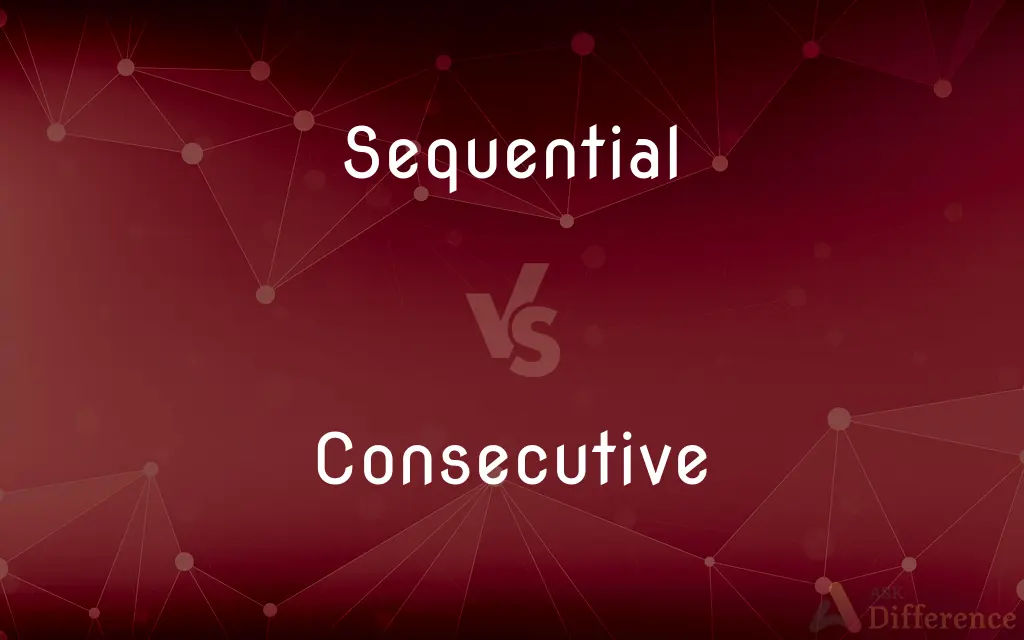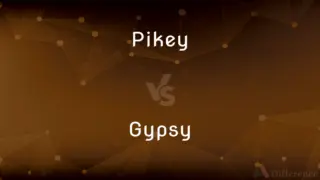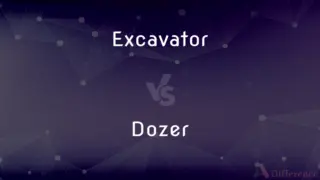Sequential vs. Consecutive — What's the Difference?
Edited by Tayyaba Rehman — By Fiza Rafique — Updated on October 30, 2023
"Sequential" refers to a consistent order or pattern, while "consecutive" denotes one after the other without interruption. Both involve order, but "consecutive" emphasizes uninterrupted succession.

Difference Between Sequential and Consecutive
Table of Contents
ADVERTISEMENT
Key Differences
Sequential relates to things that follow a particular order or sequence. It doesn't necessarily require items or events to be adjacent, just that they follow a predetermined or logical pattern. Consecutive, on the other hand, implies items or events occurring back-to-back without any interruption or deviation. In this context, consecutive events or numbers always follow immediately after the other.
In the realm of numbers, sequential might mean numbers that follow a particular pattern, such as even or odd numbers. Consecutive numbers, however, are numbers that come one after the other in the standard order, like 1, 2, 3, and so on. Both terms indicate an order, but consecutive always signifies a direct succession without any gaps.
In everyday scenarios, consider tasks on a to-do list. If tasks are listed in a sequential manner, they're organized in the order they need to be done, but not necessarily immediately one after the other. Tasks done on consecutive days, however, are done on successive days without any breaks in between.
In literature or films, a sequential narrative may jump between time periods or events but maintain a specific order crucial for the storyline. A consecutive narrative, however, would chronicle events as they happen, one right after the other, without leaping forward or backward in time.
Comparison Chart
Definition
Follows a consistent order or pattern
Occurs one after the other without gaps
ADVERTISEMENT
Numeric Application
Numbers following a pattern
Numbers in direct succession
Usage in Tasks
Order of tasks, not necessarily back-to-back
Tasks done one after the other
Time Narration in Stories
Can jump between events in order
Events happen right after the previous
Gaps Between Items
Possible, based on the pattern
None, items/events are directly adjacent
Compare with Definitions
Sequential
Following a logical or predetermined order.
The chapters in the book are organized in a sequential manner.
Consecutive
Following continuously without interruption.
He worked for five consecutive days without a break.
Sequential
Occurring or coming in sequence.
The steps for the experiment were clearly marked in sequential order.
Consecutive
Occurring in direct succession.
The conference will last for two consecutive weeks.
Sequential
Relating to the order of things.
The sequential arrangement of songs on the album told a story.
Consecutive
Successive; in uninterrupted order.
The team won three consecutive matches.
Sequential
Based on a consistent sequence or pattern.
The dancers moved in a sequential pattern across the stage.
Consecutive
Directly adjacent in order.
The consecutive numbers in the series are 4, 5, and 6.
Sequential
Arranged in a successive pattern or series.
The film displayed events in a sequential timeline.
Consecutive
Following each other continuously
Five consecutive months of serious decline
Sequential
Forming or characterized by a sequence, as of units or musical notes.
Consecutive
Expressing consequence or result
A consecutive clause
Sequential
Sequent.
Consecutive
Denoting intervals of the same kind (especially fifths or octaves) occurring in succession between two parts or voices.
Sequential
Succeeding or following in order.
Consecutive
Following one after another without interruption; successive
Was absent on three consecutive days.
Won five consecutive games on the road.
Sequential
Expressing succession of events.
Consecutive
Marked by logical sequence.
Sequential
(programming) Executed as a sequence of instructions, without concurrency or parallelism.
Consecutive
(Grammar) Expressing consequence or result
A consecutive clause.
Sequential
Succeeding or following in order.
Consecutive
Following, in succession, without interruption
Sequential
In regular succession without gaps;
Serial concerts
Consecutive
Having some logical sequence
Consecutive
A sequence of notes or chords that results from repeated shifts in pitch of the same interval.
Consecutive
A linguistic form that implies or describes an event that follows temporally from another.
Consecutive
Consecutive interpretation.
Consecutive
Following in a train; succeeding one another in a regular order; successive; uninterrupted in course or succession; with no interval or break; as, fifty consecutive years.
Consecutive
Following as a consequence or result; actually or logically dependent; consequential; succeeding.
The actions of a man consecutive to volition.
Consecutive
Having similarity of sequence; - said of certain parallel progressions of two parts in a piece of harmony; as, consecutive fifths, or consecutive octaves, which are forbidden.
Consecutive
In regular succession without gaps;
Serial concerts
Consecutive
Successive (without a break);
Sick for five straight days
Consecutive
One after the other;
Back-to-back home runs
Consecutive
In a consecutive manner;
We numbered the papers consecutively
Consecutive
Back-to-back without any deviation.
The artist released two consecutive albums in the same year.
Common Curiosities
Is a sequential narrative the same as a chronological one?
Not always. A sequential narrative follows an order but can jump in time, while chronological is strictly in time order.
Does consecutive imply immediate succession?
Yes, consecutive indicates one after the other without any interruption.
Are all consecutive events sequential?
Yes, consecutive events are a subset of sequential ones but are directly successive.
What does sequential mean in terms of order?
Sequential implies a specific or logical order but doesn't necessarily mean back-to-back.
Can sequential numbers have gaps between them?
Yes, as long as they follow a predetermined pattern or sequence.
Do sequential events always have a logical pattern?
Typically, yes. Sequential implies a consistent order or pattern.
How do sequential and consecutive relate to storytelling?
Sequential stories might jump in time but have an order, while consecutive ones narrate events as they happen.
Can days be sequential without being consecutive?
Yes, if they follow a pattern like "every other day" they are sequential, but not consecutive.
Are numbers like 2, 4, 6 considered consecutive?
No, they are sequential as they follow a pattern (even numbers) but aren't directly successive.
Does consecutive imply a fixed sequence?
Yes, consecutive items or events follow a fixed, uninterrupted sequence.
Can a list be both sequential and consecutive?
Yes, if items follow a logical order and occur back-to-back, they are both.
In what context is sequential most commonly used?
It's often used in contexts where things follow an order, like steps in a process or chapters in a book.
Which term, sequential or consecutive, emphasizes no gaps?
Consecutive emphasizes no gaps between items or events.
Are all sequential events also consecutive?
No, while all consecutive events are sequential, not all sequential events are consecutive.
How does consecutive relate to days of the week?
Days referred to as consecutive, like "three consecutive Sundays," mean those Sundays come one right after the other.
Share Your Discovery

Previous Comparison
Pikey vs. Gypsy
Next Comparison
Excavator vs. DozerAuthor Spotlight
Written by
Fiza RafiqueFiza Rafique is a skilled content writer at AskDifference.com, where she meticulously refines and enhances written pieces. Drawing from her vast editorial expertise, Fiza ensures clarity, accuracy, and precision in every article. Passionate about language, she continually seeks to elevate the quality of content for readers worldwide.
Edited by
Tayyaba RehmanTayyaba Rehman is a distinguished writer, currently serving as a primary contributor to askdifference.com. As a researcher in semantics and etymology, Tayyaba's passion for the complexity of languages and their distinctions has found a perfect home on the platform. Tayyaba delves into the intricacies of language, distinguishing between commonly confused words and phrases, thereby providing clarity for readers worldwide.














































